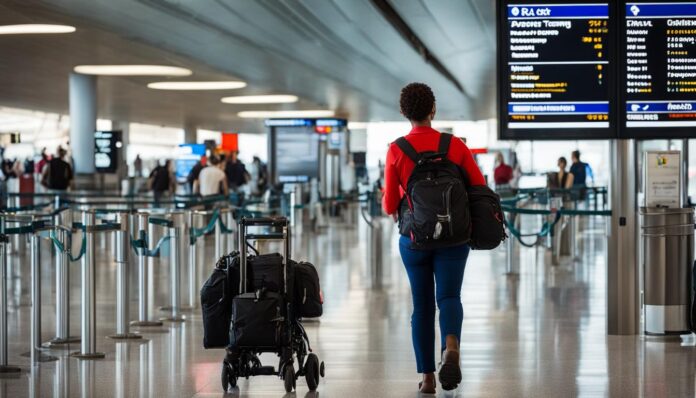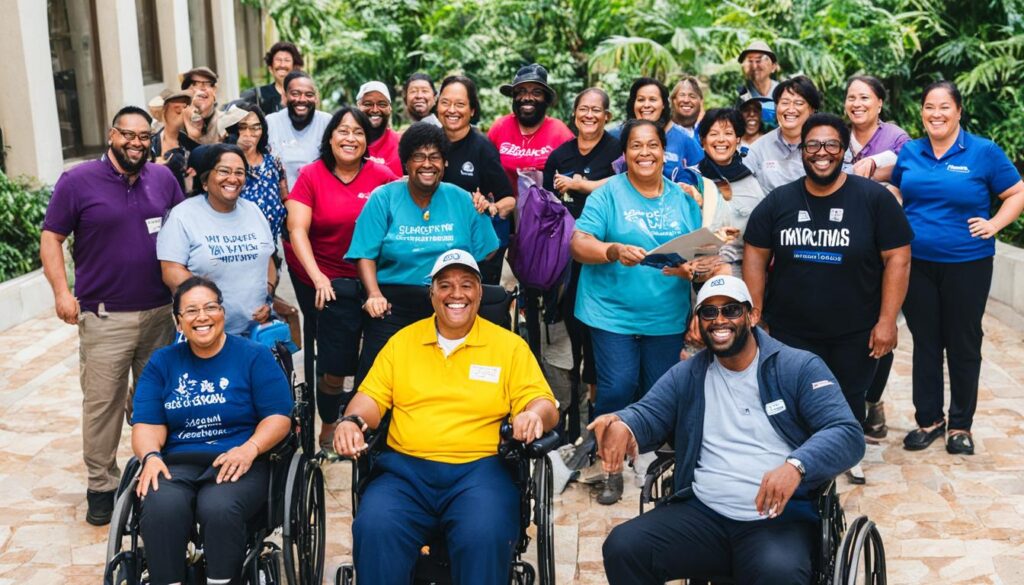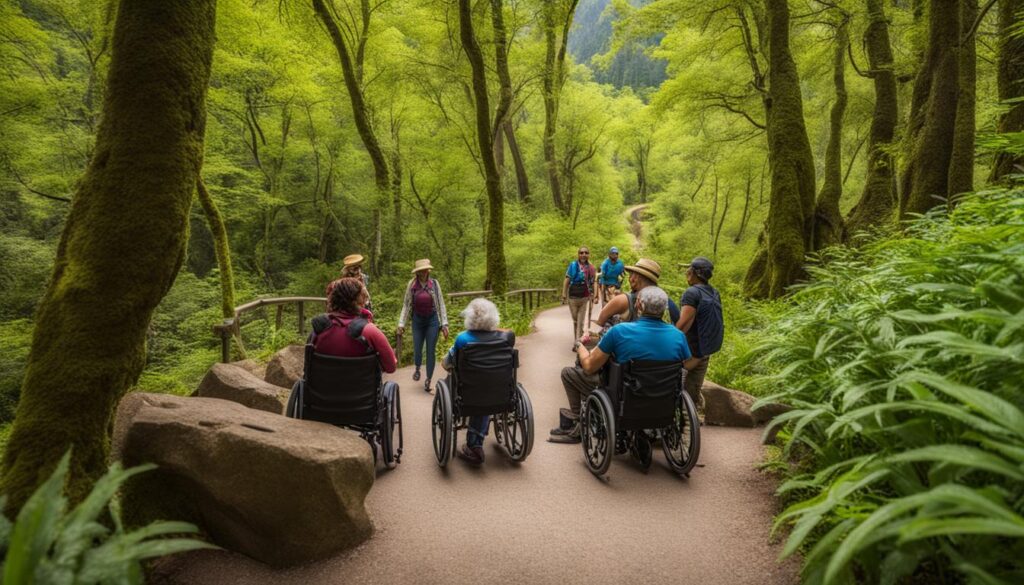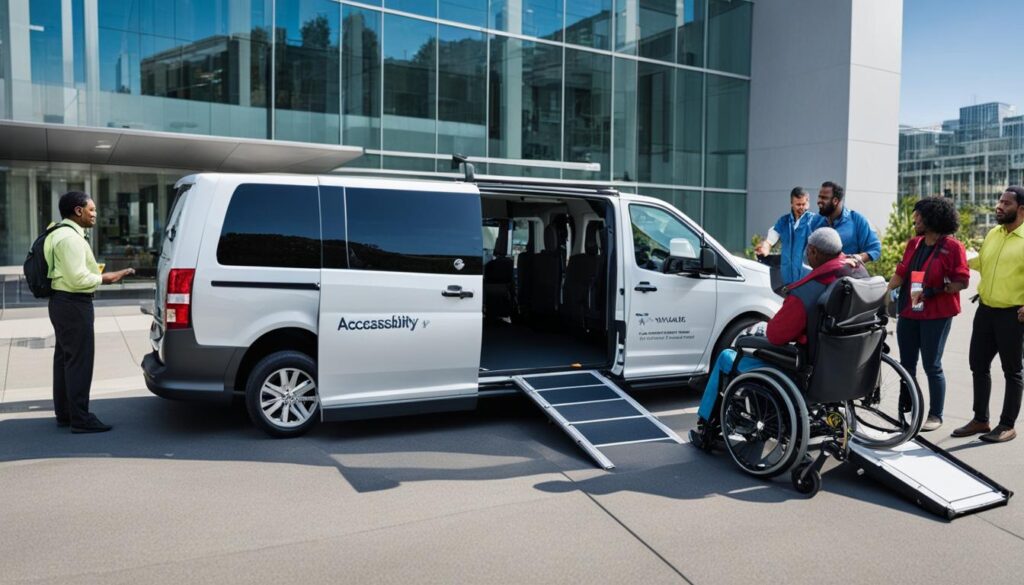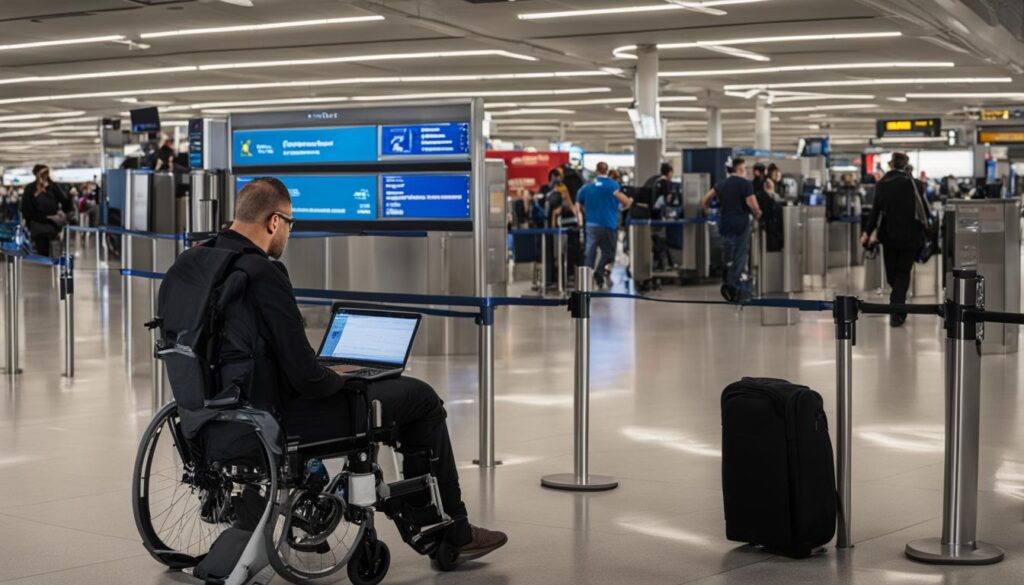If you’re a disabled worker, you may think that work and travel opportunities are out of reach. However, disability should not prevent you from exploring the world and pursuing your professional goals. With the right resources, planning, and mindset, you can find disabled-friendly work and travel opportunities that cater to your unique needs and preferences.
In this article, we’ll provide you with essential tips and information on how to successfully combine work and travel with disabilities. You’ll discover disability-inclusive work programs, job opportunities, and resources for researching inclusive travel experiences. We’ll also discuss accessible transportation options, disability-friendly accommodations, and strategies for managing medical needs while traveling.
With our guidance, you can navigate the challenges of accessible work and travel experiences and create unforgettable memories that will last a lifetime.
Understanding Your Rights as a Disabled Worker
If you’re a disabled worker, it’s important to understand your rights and protections in the workplace. The Americans with Disabilities Act (ADA) provides guidelines on disability-inclusive work and travel programs to ensure equal employment opportunities for disabled travelers. These protections extend not only to employees but also to job applicants, making it illegal for employers to discriminate against individuals with disabilities during the hiring process.
One of the most important aspects of the ADA is the requirement for reasonable accommodations in the workplace. This means that employers must make necessary modifications to allow disabled workers to perform their job duties to the best of their abilities. Accommodations can include things like accessible workspaces, specialized equipment, and flexible work arrangements.
Additionally, there are employment opportunities that are specifically designed for disabled travelers, such as disability-inclusive work and travel programs. These programs provide job opportunities and travel experiences that are accessible for individuals with disabilities, and they can be a great way for disabled workers to explore new destinations while earning a living.
Disability-Friendly Companies Offering Employment Opportunities for Disabled Travelers
| Company | Industry | Positions Offered | Services Offered |
|---|---|---|---|
| AbilityJobs | Various | Entry-level to executive | Job placement, resume review, career advice |
| Lime Connect | Business, technology | Internship, co-op, full-time | Career development, networking opportunities |
| Easterseals | Various | Entry-level to managerial | Job training, resume review, career guidance |
| Cross Cultural Solutions | Nonprofit | Volunteer | Disability-inclusive travel experiences |
These are just a few examples of companies and organizations that offer employment opportunities for disabled travelers. By understanding your rights as a disabled worker and researching these disability-friendly companies, you can find job opportunities that are tailored to your unique needs and skills.
Researching Disability-Friendly Travel Destinations
If you are a disabled traveler, researching and selecting accessible travel destinations can ensure an enjoyable and hassle-free trip. Fortunately, there are numerous resources and websites available that can help you identify disability-friendly travel destinations and find inclusive travel experiences.
Start your research by looking for information on destinations that prioritize accessibility and inclusivity. Consider browsing through travel blogs and magazines that focus on disability-friendly travel, such as Ability Magazine or New Mobility. Additionally, websites like AcessibleGO.com and The Mighty offer information on inclusive travel experiences, such as wheelchair-accessible attractions and sensory-friendly tours.
International Destinations vs. Domestic Destinations
When choosing your destination, it’s important to decide whether you want to travel domestically or internationally. While international destinations may offer unique experiences, cultural immersion, and new sights, domestic destinations may be easier to navigate, and language barriers won’t be an issue.
Transportation and Accommodations
Research accessible transportation options and disability-friendly accommodations in your destination. Be sure to read reviews and check the property’s accessibility features before making reservations. Consider calling ahead to confirm that the property’s facilities match your accessibility needs.
Disability-Friendly Tour Companies
There are numerous tour companies that cater specifically to disabled travelers. They provide unique travel experiences led by trained professionals who can accommodate your specific needs.
“I’d rather go on one disabled-specific trip with people who ‘get it’ than do a hundred trips with groups who don’t. It’s a depth of bonding and it’s an unshakeable fellowship.”
Costs and Accessibility
It’s important to consider the costs of accessible travel. While some destinations and experiences may be more expensive, there are also resources available that can help you find affordable and inclusive travel options. Additionally, budgeting can ensure that you have the resources you need to make your trip enjoyable and accessible.
When researching disability-friendly travel destinations, prioritize inclusive travel experiences and accessible transportation and accommodations. With the help of the right resources, you can plan an unforgettable trip that meets your accessibility needs and allows you to experience all that the world has to offer.
Planning Accessible Transportation
When it comes to accessible transportation, it’s important to do your research in advance to ensure that you have a smooth and stress-free travel experience. Depending on your specific needs, there are a variety of transportation options available to disabled workers and travelers.
Accessible Air Travel
If you’re traveling by air, it’s important to notify your airline of any special needs you may have, such as wheelchair assistance, a service animal, or extra time to board the plane. Most airlines provide accessible seating options that provide additional space to accommodate mobility aids. Additionally, many airports offer special services for disabled travelers, such as accessible parking, wheelchair assistance, and service animal relief areas.
Accessible Public Transportation
If you’re using public transportation, it’s important to research the accessibility of your chosen mode of transportation in advance. Many buses, trains, and subways provide accessible seating, wheelchair ramps, and modified boarding procedures for disabled passengers. Some cities also offer paratransit services for disabled passengers who are unable to use traditional public transportation.
Accessible Vehicle Rentals
If you need to rent a vehicle for your trip, many rental car companies offer accessible options, including vehicles with hand controls or ramps. It’s important to reserve your accessible vehicle in advance to ensure availability.
Pro Tip: Always call ahead to confirm accessibility options and make arrangements for any special needs you may have. This will help ensure a worry-free travel experience.
Finding Disability-Friendly Accommodations
If you’re planning a trip and have a disability, finding suitable accommodations is a crucial part of your travel preparation. Fortunately, there are a wide range of options available that cater specifically to disabled travelers, including:
| Accessible Hotels and Resorts | Many hotels and resorts offer rooms and facilities that are fully accessible for disabled guests. These accommodations typically include features such as wheelchair ramps, wide doorways, and accessible bathrooms with grab bars and roll-in showers. |
|---|---|
| Vacation Rentals | For those who prefer more privacy and independence, vacation rentals are another popular option. Many rental properties are fully accessible, with features like step-free entrances, accessible bathrooms, and wider hallways and doorways. Some rental companies even offer specialized properties designed specifically for disabled guests. |
| Disability-Friendly Resorts | Several resorts specialize in providing accessible and inclusive vacations for disabled travelers. These resorts often offer facilities such as accessible transport, wheelchair-friendly beaches, and adapted spa treatments and activities. Some resorts even offer specialized programs and equipment for guests with specific disabilities. |
No matter what type of accommodation you choose, make sure to research thoroughly before booking. Contact the property directly to confirm that their facilities meet your needs, and don’t hesitate to ask questions about accessibility features and services. With a little planning, you can enjoy a comfortable and accessible stay wherever your travels take you.
Navigating Work-from-Anywhere Opportunities
If you’re looking for accessible work and travel options, remote work and digital nomad programs could be the perfect solution for you. With the rise of technology and the internet, more and more companies are embracing remote work, allowing individuals to work from anywhere in the world.
Remote work is ideal for disabled workers, as it provides flexibility and accommodation options, such as the ability to work from home, modify work hours, and customize the work environment to meet personal needs. It’s also a great way to combine work with travel, as you can work while exploring new destinations.
Digital nomad programs, such as Remote Year or WiFly Nomads, are another great option for accessible work and travel. These programs offer the opportunity to live and work in different countries while networking with other professionals and experiencing new cultures.
Before joining a remote work or digital nomad program, it’s important to research the company’s accessibility policies and ensure they provide adequate accommodations for disabled workers. You can also look for disability-focused remote work programs, such as MY T Wylye or the Incluzy work platform (including but not limited), designed specifically to connect disabled workers with remote job opportunities.
Preparing for Accessible Work and Travel Experiences
Planning a work and travel experience as a person with a disability requires an extra level of preparation to ensure that you have everything you need to make your trip as comfortable and hassle-free as possible. In addition to standard travel preparations, you will need to take into account accessibility requirements and other specific needs related to your disability. Here are some tips to help get you started:
Pack with Care
When packing for your work and travel experience, make sure to bring any necessary medical supplies, like medications, batteries for mobility devices, and any other equipment specific to your disability. It’s also a good idea to pack extra clothes suitable for your destination, including any necessary adaptive clothing or footwear.
Arrange Necessary Accommodations
If you require special accommodations or equipment to make your work and travel experience accessible, make sure to arrange them in advance. This may include reserving accessible hotel rooms, transportation that can accommodate your needs, or arranging for any necessary medical or nutritional accommodation. Do your research on the destination and the accommodations available to ensure that you will have everything you need.
Navigate Accessible Facilities
When traveling to unfamiliar places, it’s important to be aware of the accessibility of the facilities you plan to visit. Look up accessibility information for tourist attractions, restaurants, and public transportation before your trip. You may also want to consider bringing a portable ramp if you use a wheelchair or scooter, or requesting assistance in advance if you have vision or hearing impairments.
Stay Informed
To ensure a smooth travel experience, stay informed about your rights and any policies related to disability inclusion. Familiarize yourself with the Americans with Disabilities Act, which prohibits discrimination against people with disabilities in all areas of public life, including jobs, schools, transportation and all public and private places that are open to the general public. Knowing your rights can help you advocate for yourself if you encounter any challenges during your work and travel experience.
Networking and Connecting with Other Disabled Workers
A great way to discover disabled-friendly work and travel opportunities is by connecting with other disabled workers. Disability-focused professional organizations and support networks can provide guidance, resources, and job leads that may be harder to find otherwise. Additionally, networking with other disabled workers can provide a supportive community where you can share experiences and learn from each other’s successes and challenges.
There are many organizations and networks dedicated to assisting disabled workers, such as Disability:IN, a leading nonprofit organization that helps businesses become more disability-inclusive. They offer networking opportunities, certification programs, and other resources for businesses and individuals alike. You can also check out online communities like Disability.Gov, which lists various resources and networks for people with disabilities.
Networking can also be done in person at events and conferences. Consider attending disability-specific events such as job fairs and conferences, or events in your field of interest. This is a great way to meet other disabled workers and learn about accessible work and travel opportunities.
“Networking with other disabled workers can provide a supportive community where you can share experiences and learn from each other’s successes and challenges.”
Managing Medical Needs While Traveling
Traveling with a disability requires careful planning, especially when it comes to managing medical needs while on the go. Here are some useful tips to help you navigate healthcare systems, pack necessary medications, and access medical services in different destinations:
Navigating Healthcare Systems
Before embarking on your trip, research healthcare systems in your destination. Make a list of local hospitals, clinics, and pharmacies that provide disability-friendly services. Consider purchasing travel insurance that covers pre-existing conditions and emergency medical evacuation in case of unforeseen circumstances.
Packing Medications
Be sure to pack all necessary medications, including prescriptions, over-the-counter remedies, and medical supplies. Keep them in their original packaging, with clear labels and instructions. Carry a copy of your prescriptions and medical history, in case you need to seek medical help while traveling. Additionally, bring extra supplies to ensure you don’t run out of medication.
Accessing Medical Services
If you need to access medical services while on your trip, consider contacting your embassy or consulate for assistance and recommendations. Use disability-friendly travel resources, such as Accessible Journeys and Disability:IN, which provide information on disability-friendly healthcare providers and medical transportation services in different destinations.
Remember that managing medical needs while traveling requires advance planning and preparation. By taking these steps, you can ensure a safe and enjoyable trip, without sacrificing your health and well-being.
Overcoming Travel Challenges with Disabilities
While traveling can be an exhilarating experience, it can also entail unique challenges for individuals with disabilities. However, with the right resources, tools, and preparation, you can overcome these challenges and enjoy a fulfilling travel experience. Here are some strategies to help you overcome common travel hurdles:
Accessibility Challenges
One of the biggest challenges faced by disabled travelers is finding accessible accommodations, transport, and attractions. However, disability-inclusive work and travel programs, like those offered by the nonprofit organization Mobility International USA, can help address these challenges. Such programs cater to the needs of disabled individuals, ensuring that accommodations, transport, and attractions are all accessible.
Communication Challenges
When traveling in a foreign country, language barriers can make communication difficult. Consider using translation services like the Google Translate app or hiring a local guide who is fluent in your language. Additionally, learning a few basic phrases of the local language can help you communicate better with locals.
Cultural Differences
Every country has its own cultural norms and customs, which can pose a challenge for disabled travelers. Consider researching the cultural norms of your destination before you travel to avoid any misunderstandings. Moreover, disability-friendly travel resources like the nonprofit organization, Accessible Journeys, specialize in disability-inclusive travel that takes into account cultural differences and ensures that you have an enjoyable travel experience.
By employing these strategies and using disability-inclusive work and travel programs, you can overcome common travel challenges and experience all that the world has to offer.
Personal Stories of Successful Disabled Travelers
If you’re looking for inspiration on how to combine work and travel as a disabled individual, look no further than the personal stories of those who have already done it. These individuals have navigated the challenges of disability-friendly work and travel opportunities and come out on top, achieving their goals and living their dreams.
“I never thought I could work while traveling as someone with a disability, but I found a remote digital marketing job that allowed me to work from anywhere. I’ve been able to explore new destinations while still having a stable income.”
– Silvia Rodriguez, Digital Marketer
Silvia Rodriguez’s story shows that remote work can be an accessible work and travel option for disabled individuals. Thanks to advances in technology, many jobs can now be done from anywhere in the world. Whether you’re a writer, designer, or programmer, there are plenty of opportunities out there for remote work.
“I love exploring new cultures, but as a deaf traveler, communication can be a challenge. However, I’ve found that many countries have a thriving deaf community, and I’ve been able to make connections with locals who can use sign language.”
– Andrew Lee, Travel Blogger
Andrew Lee’s experience highlights the importance of researching disability-friendly travel destinations before embarking on a trip. By finding communities and resources that cater to your needs, you can have a more inclusive and enjoyable travel experience.
| Name | Profession | Travel Accomplishments |
|---|---|---|
| Alexandra Adams | Writer | Travelled to 25 countries and wrote a book about her experiences |
| Chris Johnson | Photographer | Documented the lives of disabled individuals around the world |
| Jessica Chen | Consultant | Worked on disability advocacy projects in Europe and Asia |
These stories represent just a few examples of disabled-friendly work and travel opportunities that are available for disabled individuals. By networking, researching, and preparing adequately, you too can achieve your travel and career goals while accommodating your disability.
Conclusion
In conclusion, combining work and travel can be an exciting opportunity for disabled workers. By following the right tips and strategies, you can make your work and travel experience accessible, inclusive and enjoyable. Remember to research disability-friendly destinations, plan for accessible transportation and accommodations, and connect with other disabled workers for support and networking opportunities. Managing your medical needs while traveling and overcoming common travel challenges can also enhance your work and travel experience.
We hope the information provided in this article has been helpful in guiding you towards disability-inclusive work and travel programs and opportunities. By prioritizing accessibility and inclusivity, you can successfully navigate work and travel with disabilities and achieve your goals.




























